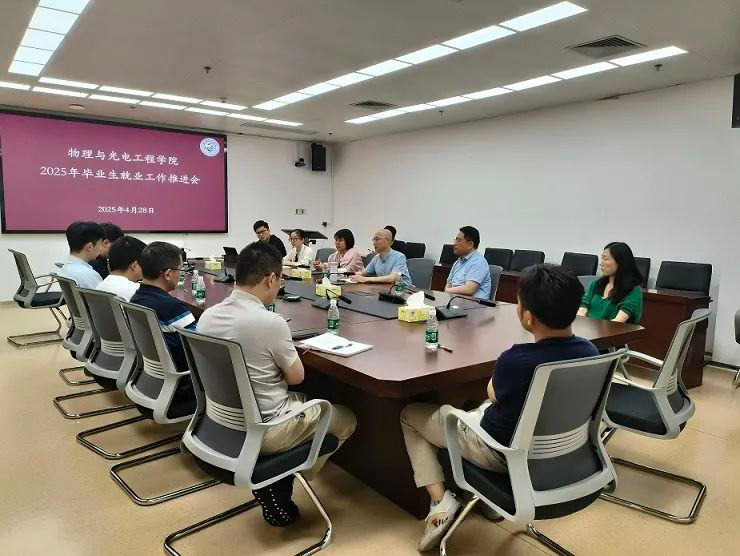To thoroughly implement the university’s decision-making and deployment on graduate employment work and fully promote high-quality and full employment for the 2025 graduating class, the College of Physics and Optoelectronic Engineering held the 2025 Graduate Employment Promotion Meeting in the Zhiyuan Building Conference Room on the afternoon of April 28. Attendees included Lin Bing, Secretary of the College Party Committee; Liu Liwei, Executive Dean; Wu Honglei, Vice Dean; Long Xiaoli, Deputy Secretary of the Party Committee; Wang Jipu, Vice Dean; heads of various departments; graduate class teachers; and counselors.

At the meeting, Long Xiaoli briefly introduced the employment status of the college’s 2024 graduates, conveyed the university’s employment goals for the 2025 graduating class, and reported the initial employment rate of the 2025 graduates up to now. Addressing the new challenges and circumstances in current employment work, she outlined the main measures for the next phase: 1. Deeply carry out the “Enterprise Visits for Employment Expansion” initiative to strengthen deep cooperation with employers and expand high-quality employment channels. 2. Conduct comprehensive investigations, provide active guidance and precise assistance, enhance employment counseling services, and offer personalized support to help students improve their employability. 3. Strengthen psychological counseling and employment adaptation for students. Subsequently, Meng Bo, class teacher of Class 1, Optoelectronic Information Science and Engineering, Grade 2021, shared his experience in promoting employment. Since September last year, Mr. Meng has conducted detailed investigations into students’ intentions for further studies and employment in his class, established a detailed file for each student, regularly updated data, and recorded their dynamic changes to maintain a clear understanding of their situations. He strictly implemented the “one student, one file” and “one student, one strategy” work mechanisms, providing targeted guidance and support by tapping into students’ strengths, helping them identify career goals, building employment confidence, and teaching skills for further studies and job applications.
Liu Liwei highly praised Mr. Meng’s sense of responsibility and work methods, urging all teachers to learn from him and always prioritize the college's development and students' growth, demonstrating the responsibility and dedication of educators through practical actions. In her employment work deployment, she emphasized that department heads, graduate supervisors, class teachers, and counselors must deeply understand the significance of employment work, strengthen their sense of responsibility, mission, and urgency, and form a strong joint force for employment. She proposed building an employment work framework of “college coordination, department implementation, university-enterprise collaboration, and full participation” to ensure both the “precision” and “warmth” of employment work and guarantee high-quality and full employment for the 2025 graduates.
Finally, Lin Bing emphasized in his concluding speech that employment is not only related to graduates' futures but also closely linked to the college's development and social reputation, making it a shared responsibility for all educators. He pointed out the need to integrate campus and off-campus resources to form a collaborative support system, provide comprehensive and multi-level employment support for graduates, actively expand job resources, build a “reservoir” of incremental positions based on existing recruiting enterprises to ensure precise matching between job resources and graduate needs, and fully leverage internal strengths by uniting party and government leaders, departments, outstanding alumni, and other educational resources to carry out targeted employment assistance, track progress dynamically, adjust strategies timely, and provide positive guidance to students. The convening of this meeting fully demonstrates the college’s high attention to graduate employment work. Through comprehensive analysis, precise deployment, and collaborative advancement, the college has further consolidated the consensus of all staff on prioritizing employment and clarified the work direction and key tasks for the next phase. Going forward, the college will make more pragmatic efforts and devote greater enthusiasm to achieving new results in employment work for the 2025 graduates and helping them successfully launch their career journeys.


![]() Add : No. 3688, Nanhai Avenue, Nanshan District, Shenzhen, Guangdong Province
Add : No. 3688, Nanhai Avenue, Nanshan District, Shenzhen, Guangdong Province ![]() Email : cpoe@szu.edu.cn
Email : cpoe@szu.edu.cn ![]() Phone: 0755-26538735
Phone: 0755-26538735 ![]() Fax : 0755-26538735
Fax : 0755-26538735